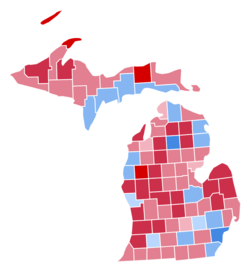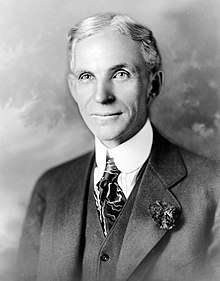1918 United States Senate election in Michigan
The 1918 United States Senate election in Michigan took place on November 5, 1918, in order to elect the Class 1 U.S. Senator from the State of Michigan, concurrently with a gubernatorial election, as well as other elections to the U.S. House of Representatives.
| |||||||||||||||||
| Turnout | 15.60% | ||||||||||||||||
|---|---|---|---|---|---|---|---|---|---|---|---|---|---|---|---|---|---|
| |||||||||||||||||
 County Results Newberry: 40–50% 50–60% 60–70% 70–80% Ford: 40-50% 50–60% 60–70% | |||||||||||||||||
| |||||||||||||||||
Former Secretary of the Navy, Republican Truman Handy Newberry, was elected to succeed outgoing incumbent U.S. Senator William Alden Smith. Newberry defeated Democratic industrialist Henry Ford, who had failed in acquiring the Republican nomination from Newberry during the initial primaries.
The race was highly controversial, mostly due to Ford's presence in the race, with Newberry hammering Ford for his pacifism amidst World War I, his antisemitism, and for helping his son, Edsel, avoid the draft.[1] Newberry narrowly won the election but was forced to resign from the Senate amid accusations of election fraud.
Democratic primary
Candidates
Nominee
- Henry Ford, industrialist
General election
| Party | Candidate | Votes | % | ± | |
|---|---|---|---|---|---|
| Republican | Truman Handy Newberry | 220,054 | 50.19% | ||
| Democratic | Henry Ford | 212,487 | 48.47% | ||
| Socialist | Edward O. Foss | 4,763 | 1.09% | ||
| Prohibition | William J. Faull | 1,133 | 0.26% | ||
| Total votes | 438,437 | 100% | N/A | ||
| Republican hold | |||||
Aftermath
Ford felt "cheated" by the final result, and would employ at least 40 private investigators to investigate. They compiled their report and sent it to the Department of Justice, who assigned a special prosecutor who had relations with a lawyer employed by Firestone, who also helmed the private investigation Ford initiated.[3] The special prosecutor charged Newberry of violating the Federal Corrupt Practices Act (FCPA), which barred candidates for the Senate from spending more than 10,000$ during their campaign. Newberry, having spent at least 100,000$ during the Republican primary, was subsequently tried and convicted in 1921.[4]
However, Newberry would successfully appeal his conviction to the Supreme Court, who ruled in a 5-4 decision that the FCPA was unconstitutional in Newberry v. United States. Newberry was allowed to retain his seat, though faced a condemnation by the Senate for his excess spending. Newberry ultimately resigned in 1922 and was succeeded by James J. Couzens, a former employee of the Ford Motor Company.
References
- Glass, Andrew (January 12, 2018). "Senator 'condemned' for excessive campaign spending, Jan. 12, 1922". Politico. Retrieved August 5, 2020.
- "1918 Michigan general election results". Our Campaigns. Retrieved August 5, 2020.
- Felten, Eric (November 27, 2018). "History Lesson: Henry Ford Was the World's Biggest Sore Loser". Washington Examiner. Retrieved August 5, 2020.
- Glass, Andrew (November 18, 2014). "Sen. Truman Newberry resigns, Nov. 18, 1922". Politico. Retrieved August 5, 2020.
Further reading
- Baker, Paula (2012). Curbing Campaign Cash: Henry Ford, Truman Newberry, and the Politics of Progressive Reform. University Press of Kansas. ISBN 978-0700-618-637.
.jpg)
